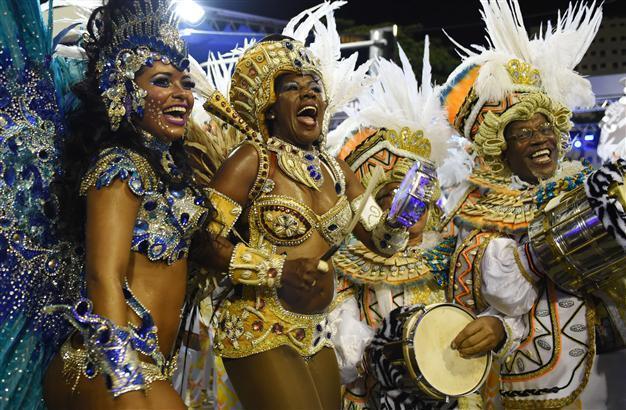Controversy-hit samba school wins Rio carnival title
RIO DE JANERIO - Agence France-Presse

AFP Photo
A Brazilian samba school shrugged off a controversy over alleged funding by an African strongman president and went on to claim its 13th win at the Rio Carnival championship on Feb. 18.The Beija-Flor school, whose name means hummingbird, has denied media reports it was bankrolled to the tune of nearly $5 million by the president of Equatorial Guinea, Teodoro Obiang Nguema.
Obiang Nguema and his son are facing allegations of money laundering and corruption. The leader holds an iron grip over tiny, oil-rich Equatorial Guinea and critics have labeled him a ruthless dictator.
Hailing from the Rio suburb of Nilopolis, Beija-Flor scored 259.9 points to land its 13th title and see off rivals Salgueiro by 0.4 points.
Known for its creativity, the Beija-Flor team will now bring the final curtain down on this year's carnival festivities at Saturday's Parade of Champions, comprising the top six schools.
The Portela school came third, and last year's grand champions, Unidos da Tijuca, were in fourth place.
The press service for Beija-Flor, whose theme was a "strong, joyful and colorful" Africa, told AFP they had merely received "cultural support and imported fabrics" from Equatorial Guinea, which is located on the Atlantic coast in central Africa.
After results were announced, Beija-Flor supporters burst into wild cheers at the Sambadrome in downtown Rio, where Sunday and Monday night the top 12 samba schools had battled it out for glory.
"I am very emotional, very happy," Rayssa Oliveira, one of Beija-Flor's beauty queens, told Globo television.
The jury considered various aspects of each team's performance in carefully choreographed parades at the Sambadrome in front of crowds of some 72,000 people.
The jurors award points in categories ranging from the highly decorative school floats, the quality of their massed ranks of percussionists and how well the roughly 4,000-strong team move in sync with each other while singing their school song.
The record of carnival celebrations dates back to 1723 -- but the first samba school was not formed until 1928.
















